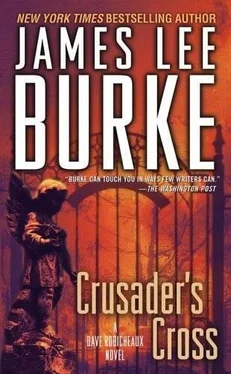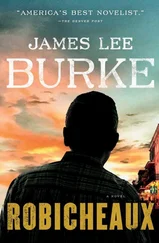"No, they didn't," I replied.
"Well, he surely didn't have any business in your yard. Besides, it was raining to beat the band. So why would he have been by your window if he wasn't a Peeping Tom?"
"What did this fellow look like, Miss Ellen?"
"I don't really know. He was wearing a raincoat, one with a hood."
"Was he white?"
"I wouldn't know that, either. Are you going to have your cat fixed?"
"Probably not."
"You should. His romantic inclinations seem to have no bounds," she said.
I wondered if there was a second meaning in her statement.
Inside, I called the city police department and talked to the dispatcher. He told me a patrol car had been sent to my address at 11:16 Friday night, but no one had been in the yard, and the responding officer saw no point in waking me up. "Dave, Miss Ellen said the Peeping Tom was in her yard, yours, and maybe two or t'ree yards on the other side of you," the dispatcher said. "We would have had to wake up the whole block. You know how many calls we get from that lady every week?"
I went outside and walked through the side yard by my bedroom windows. The flower bed was planted with hydrangeas and camellias, and the mixture of black dirt, coffee grinds, and compost mixed with horse manure that I used in my gardens was still soggy from Friday night's downpour. Underneath the windowsill were the deeply etched prints of a man's work boots. The blinds were just as they had been Friday night – two inches short of the sill, a perfect viewing slot for a voyeur to have watched Molly Boyle and me in the throes of our passion.
After work I drove down Old Jeanerette Road to Molly's agency and caught her at the end of her workday, carrying a shovel, hoe, and steel rake over her shoulder toward the barn, a machete hanging from her other hand. "How was New Orleans?" she said.
"The same," I said, not mentioning the death of the runaway girl from Iowa. Inside the barn, I watched her put away her tools, first wiping each of them clean, hanging them from nails on the walls. "Molly, would anyone have reason to follow you around?" I asked.
"Why would anyone want to follow me around?"
"The neighbor thought someone might have been in my yard Friday night," I replied. "But my neighbor is a little eccentric sometimes."
Molly smiled, as though the subject were of little consequence, then began sharpening her machete on the emery wheel, orange and blue stars dancing on her jeans. She wiped the blade on an oily rag, then hung the machete on a wood peg.
"You keep your tools sharp," I said.
"My father taught me that. He had simple admonitions: 'Feed your animals before you feed yourself… Take care of your tools and they'll take care of you…' Put your shotgun through the fence, then crawl after it.' My favorite was 'Never trust a white person black people don't like.' "
"Come to the house," I said.
"I can't."
"I know a motel on the other side of Morgan City. It's on the water, off the highway. Not many people go there. There's a restaurant where we can have dinner."
I could see the conflict in her face. "Come on, Molly," I said, my voice almost plaintive.
We were there in under a half hour. Not only there, but in the shower stall, the hot water beating down on our heads, her legs clenched around my thighs, her fingers splayed on my back, her mouth wide with a cry that she fought to suppress but could not.
Then we were on the bed and she came a second time, her stomach and thighs rolling under me, her mouth wet against my cheek. Her hair and skin smelled like the ocean, or the smell a wave full of seaweed gives off when it bursts on hot sand. Then somewhere down below a coral shelf a mermaid winked a blue eye at me and invited me to come and rest inside a pink cave where she lived. The sound went out of the room, and when I opened my eyes the shadows of the overhead wood fan were flicking across Molly's face, like clock hands out of control.
New Iberia has always been an insular place, Shintoistic, protective of its traditions, virtually incestuous in its familial relationships and attitudes toward outsiders. It did not take long for the rumors to start about me and Molly Boyle. One week after our tryst in the motel outside Morgan City, Molly received a call from a priest in the diocesan office. He was an elderly, genteel man who obviously did not enjoy the charge that had been given him. He asked about her health, how she was doing in her work, was there any problem in her life that either he or another clergy member could help her with.
"No, but it's very thoughtful of you to ask," she replied. "Everything is wonderful here, Father. Come visit us sometime."
"Well, I guess that answers that," he said. Then, probably because of his years and his long experience with human frailty and the harsh judgment the world can visit upon the innocent, his voice changed. "Take care of yourself, Molly. You're a good girl. Don't load the gun so others can hurt you."
That same day, Helen tapped on my door. "How you doin', Streak?" she said.
"Right as rain," I replied.
She sat on the corner of my desk and fed a stick of gum into her mouth. Her triceps were ridged like rolls of nickels. "I've gotten three phone calls and several anonymous letters about someone you might be seeing," she said.
"Who might that be?"
She chewed her gum, her eyes roving over my face. "I'm your friend, bwana. Don't treat me disrespectfully."
"A person's private life is his private life," I said.
"That might flush in San Francisco, but not on Bayou Teche. If you're involved with a Catholic nun, I'd damn well better know about it."
"The person you're talking about never took vows. In fact, she's been thinking about returning to the role of a lay person. She's a person of enormous conscience."
My words sounded rehearsed, even to me, as though I had read them off an index card. Helen looked out the window at a freight train wobbling down the tracks between two rows of shacks. "They're going to put you inside the Iron Maiden," she said.
"Who's 'they'?" I said.
"Take your choice," she replied.
Three more days went by. People were polite to me on the street and at the supermarket or the filling station, but it was obvious that something in my life had changed. Few stopped to talk, and none joined me at a coffee counter or table in a restaurant. Those who could not escape a social encounter with me held their eyes steadily on mine, fearful I would read the knowledge that was hidden there. Frequently another cop gave me a thumbs-up or hit me on the shoulder, as if I were spiritually ill. I even cornered one of them in the department's men's room and learned quickly that acceptance of sympathy is not without a price.
"I look like the walking wounded?" I said, and tried to grin.
"Thought you needed a boost in morale, Dave, is all I was doing. Didn't mean to get in your face," he said.
"Can you spell that out?"
"My ex spread rumors I molested my stepdaughter. So I know where you're at right now. I say, screw all them people. You know the troot' about my situation? She come on to me. But don't nobody care about the troot'. So I'm like you, screw 'em."
Then, just before quitting time, a phone call changed my perspective in ways I could not quite put together. It was from Dana Magelli in New Orleans. "We got the DNA report back on Holly Blankenship. It's a match," he said.
"Match with what?" I said.
"The Baton Rouge serial killer. He killed her within twelve hours of the time you and Purcel interviewed her. I don't get it, Dave. This guy hasn't struck in New Orleans, but he shows up in town the same day you do and murders a hooker. That's not the guy's M.O. So far, he's left street people alone. Got any thoughts?"
Читать дальше












